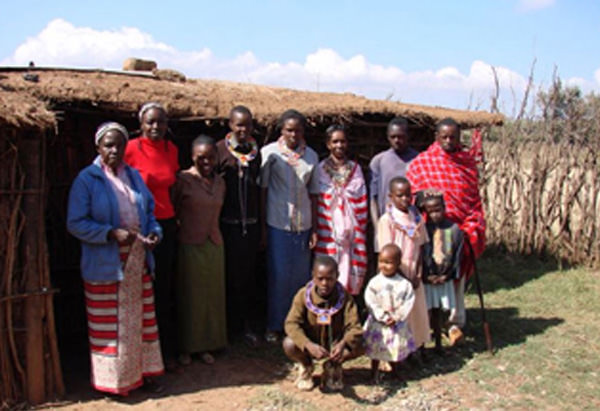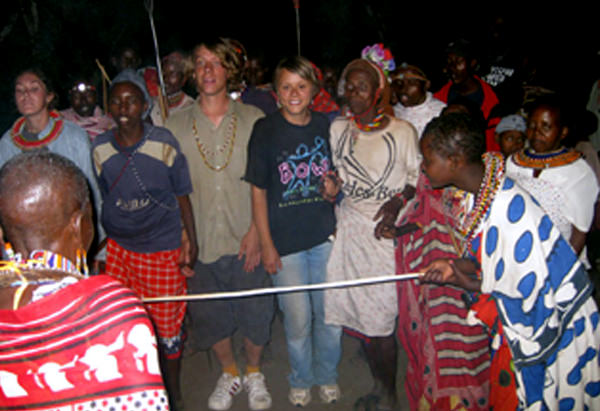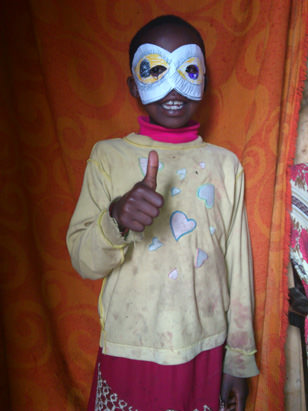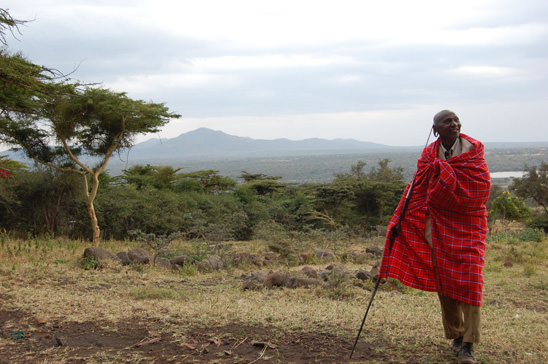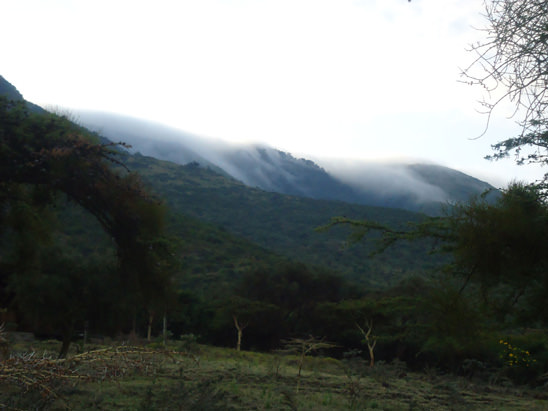More information
Where will I be staying?
Living 30 miles south of Nairobi on the protected Masai reserve amongst the Masai tribe places you in probably the safest part of the whole of Kenya. There is a great community spirit in the Masai, away from the hustle and bustle of the city of Nairobi, by contrast everyone here knows each other, looks out for one another and as a consequence, crime is virtually non-existent so you will be in safe hands.
Where are the clinics and pharmacies? And how do I get there?
Health centres are located in the Masai land at Oloosho-oibor and Ilkilorit villages and Ngong town. Ngong is the closest town to the Masai villages over the ridge. It is a 1.5 hour walk through pleasant wooded countryside or take a motorbike taxi (£6 return for 50 minute round the ridge, pre-book with the regular taxi a day in advance). For volunteers in the Masai villages, volunteers walk with their host family until they know the route and are settled in. Often families will continue to escort their guest throughout a visit. For volunteers at the clinic in Ngong town, motorbike taxi is the only practical option on a daily basis. A home stay in Ngong town can also be arranged and a transfer can be organised for you after arrival, spaces permitting.

There is always something being built or repaired in Masai land. Here volunteers build a new lending library for the resources volunteers bring with them

One to one attention and informal teaching outside of the Masai school can be just as important, especially where school education for the Masai children is only available for a few hours a day
What else can I do?
Hang out with your host family! Engage, chat, help with the midday meal, learn to milk the goat, play with the younger children while mum is busy and share stories. Did you know that the first host families asked every volunteer how many goats they had at home! Getting to know your host family is an essential part of the experience and can reveal a lot about how this unique community lives. There are also a number of orphans in the community and a new orphanage is being built to home 25 children. It is expected this will be finished in 2017 but work is slow due to limited funds. Read about Gill James’s experience with the Masai.

Moto-taxi is the easiest way to get into Ngong town for supplies. It’s only £3 and saves a two hour walk over the Ngong Hills when you are in a hurry

Numerous projects have been completed by scratch from volunteers. Here the community library, built by volunteers from the UK company Butlins was finished in just 5 days.
How will I know where I will be based for a health placement?
All volunteers stay in the Masai land villages in the first instance. Long stay volunteers can choose later if they would like to move into Ngong town, spaces permitting.
Are meals provided?
Kenyans make their food from locally sourced produce such as goat, chicken and vegetables with rice. When staying with your host family, you will be provided with three traditional meals per day. These can be starchy so take your extra special treats from home. We recommend you top up with snacks and plenty of drinking water on arrival in Kenya at a supermarket on the way so no need to take everything from home! Long life cartons of milk, juice and long life bread and biscuits are essential due to the walking distance into Ngong town. Masai breakfasts generally consist of Chai (tea), toast, cereal, fruit or Mandazi (deep fried dough). A typical lunch can include meat and vegetables in gravy with rice, or sandwiches and fruit. Dinner, usually served between 7 and 8pm is a more traditional fare of ugali, chapatti, moboga with some meat and vegetables. However there is plenty of time at the weekend to shop in Ngong town for treats and snacks. You can reach Ngong on foot over the ridge which is a protected national park with great views. If you are not feeling that energetic for the 2 hour stroll, a motorbike taxi can be pre-booked and costs approx. £3 each way for the 50 minute journey.

Giraffes wander freely around the Masai community where you stay so you might not feel the need to go on safari at the end of your stay

Most volunteers are only a a few fields walk away from Olasiti primary school and everyone is welcome to get involved and help out whatever your background
How can I stay in touch with home?
Calling home (and locally) on a UK SIM is expensive. A Kenyan SIM can be bought for about a £1 to keep you in touch with other volunteers on the programme. Make sure you unlock your phone before you travel. In Kenya, Safaricom is the most popular network. Kenyans often top up with 50 KSH and buy phone cards in denominations of 200, 500, 1000 and 2000. The local team will go through the options on arrival at your orientation. If you need to call home on a payphone, it is approximately 50 UK pence per minute to call from a phone booth/internet cafe.
Will I be on my own?
We will Buddy you up with another volunteer so you can fly out and volunteer together, just let us know at the time of booking. Even if you travel alone, because there are fixed arrival dates, it is likely there will be a few other volunteers arriving on the same day and perhaps the same flight. Also, you may like to create a profile on the travel buddy list and leave a comment on our main Facebook page too for others to contact you. And if there are a few days when you are the only volunteer in your village, it will not be long before another volunteer arrives to join you!
What happens if I book with a friend?
All friends are met and transferred to the Masai village together. Let us know when you book if you are travelling with a friend so we can place you with the same host family in the same village (there are more than 3 villages volunteers live at). Because everyone chooses what they want to do each day, you can stay together with your friend unless you want to work in different locations!
How will I travel around?
It is very easy to get around in Kenya although on this programme, other than one trip into Ngong town for supplies and a beer and a safari, most volunteers stay together at the Masai village. To get into town, many volunteers walk (remember to bring strong walking boots/trainers as the ground is can be rough) If you want to get out and explore, transport is usually by matutu, basically a mini-bus. It is not far in miles to get to Nairobi but getting out of the Masai village into town then onto Nairobi can take longer than you would expect it to back home so leave early and stay overnight in Nairobi if you can. Generally volunteers only go back to Nairobi to join a tour or fly home. Ask your coordinator about getting back to the airport at the end of your stay, they will be more than happy to organise this for you.
Will I have any free time?
In essence as this is a self-directed programme, all your time is your free time on the programme. It is entirely up to you how you organise your days, just let your family know if you will be away from the house during the day or travelling further away as you would if you were staying with a family as a guest at home. During the week you can easily Some head into Ngong if you have time between things to shop; go to a cafe and email home. More often volunteers organise themselves into groups with locals to go exploring the countryside; this way you are not alone, feel safe and can have fun with others. Trips and excursions further afield can be easily arranged by your coordinator after arrival. Scroll down this page to the free time section for more information.
Is there a list of what I need to take with me?
Here’s a list of items recommended by volunteers:
- Sleeping bag (warm one recommended for June to August)
- Malaria tablets and mozzie net
- Padlocks for luggage and small daypack for daily use
- Strong footwear lightweight walking boot/sturdy trainers
- Wet wipes – lots!
- Small dark coloured towel which won’t show the dirt
- Head torch
- Bar of soap as lasts longer
- Bovril or Marmite to add flavour to pasta or make hot drink
- Toothbrush cover
- Plastic jug and small cup for shower (where available)
- Tea from home essential for tea drinkers!
- Hair bands
- Toilet paper (preferably a roll of biodegradable)
- Mosquito repellent
- Dry shampoo, Immodium tablets, painkillers, needle/scissors/sewing kit
- Jumper/fleece for the evenings which can be cooler
- Swahili phrasebook or dictionary
- Airtight plastic food containers to store biscuits/bread and treats
- Plastic mug, bowl and utensils if you prefer your own set
- Some volunteers recommend Berocca tablets to flavour the water purifying tablets if you are taking them, most volunteers only drink bottled water bought in town
- Personal treats from home

Teaching volunteers tend to focus on pre-school and juniors and are often walked home after school when you know where they all live

Healthcare placements are available for all levels. This is also always need for basic first aid in the community at anytime (above) with foot problems and cuts and scratches common due to the environment
Will I need a visa for Kenya?
UK passport holders now (as of 2015) require a visa before travel to Kenya. This is started online at least 30 days before travel.
Are there specific arrival dates?
All volunteers should purchase flights which arrive on the 15th or 30th of the month. This enables host families to be organised more easily by the local team. This also increases your chances of arriving at the same time as other volunteers so you can share your arrival and settling in together as a group.
What happens on arrival?
On arriving in Nairobi, there will be someone there waiting for you at the airport. The person that picks you up at the airport is a regular driver who collects all volunteers and will usually take you to the volunteer accommodation close by for an orientation and overnight stay. It may be possible to transfer straight to the village depending on time of day and other volunteers arriving. The co-ordinator will explain how things work the next day you will then be transferred to the project. Before heading off to your village you will have an opportunity to stock up on supplies at a supermarket to make sure your stay with your host family is as comfortable as possible whilst you settle in during the first week.
What is it like living with a Masai family?
Hundreds of years ago the Masai lived in huts made of twigs and sticks, recently due to the scarcity of wood following droughts, many families live in simple shelters made from corrugated metal. Come prepared for rustic living, with no electricity (or limited to where volunteers have donated equipment) or running water. Volunteers usually have a hut or shed away from the family accommodation although in some families you may stay within the family dwelling. Rooms/sheds usually fit two volunteers. Water is a constant struggle for the Masai so don’t forget to bring some wet wipes with you and hairbands or a headscarf for your hair. Some volunteers have recommended dry shampoo. Volunteers staying with families without toilet facilities have bought a bucket for their room although it is hoped all families soon have at least the use of communal facilities built by volunteers soon. As water is limited you may not be able to wash as often as you would at home so expect to have dirty hands during the day. In the morning animal noises start early so you might not need an alarm clock!
Unfamiliar smells, dust blowing into your room covering everything, children poking their head round every doorway to look at their visitor, using your head torch for light for the long evenings when the sun sets and spontaneous Masai celebrations,just when you thought it was safe to get an early night. However, the far reaching views and wildlife passing by should however make up for any compromises in living standards and unfamiliar routines. See the Accommodation tab above for more and pictures.
Are return transfers provided?
Your coordinator will help organise this for you if you would like one of the drivers to take you straight back to the airport. For this project it is recommended to book this as soon as you know what your plans are to avoid communication delays with your coordinator as mobile signals can be intermittent in the Masai villages. Some volunteers leave their village independently with other volunteers to go on safari or visit Nairobi before flying home so you may want to wait a few days into your stay before confirming plans with the coordinator.
Is accommodation included in the weekly costs?
Your host family accommodation is organised for you and included in your weekly project costs.
How are payments organised if I stay for uneven weeks?
Project costs are calculated on a nightly basis. So if you stay for 12 nights, 12 nights are payable. This helps you to get the best flight deal and work around the flight dates.
How can I keep myself healthy?
Because life is simple with the Masai and few volunteers leave the community other than for a safari or a day trip into Ngong to top up essential supplies, there are few, if any health or safety related incidents of note. There is also a local hospital nearby that is easy to get to should you need to see a doctor. Malaria tablets are essential and need to be started before travel to ensure greater immunity. You will also need some other jabs and boosters before travel, it is a good idea to consult a trained health professional after visiting the NHS website FitForTravel.
Is there a fridge to store insulin?
With most of the Masai community still without electricity there is sadly not a fridge yet available to store insulin. For similar programmes with fridges please see our Ghana and Uganda programmes.
What do I need to bring?
The Masai community has very few resources and luxuries and without a hectic schedule and electricity time can pass more slowly, so pack extras accordingly. A thick novel or history/culture/Masai of Kenya guide, a journal, a pack of cards, a couple of games to play with the children and adults in the evening. Other basics to include: mosquito net, sleeping bag, pillow and a head torch. A lockable trolley type suitcase can also be more practical to keep the dust out of your clothes for long stay volunteers. If you plan to teach during your stay, may also wish to bring some activity books for primary school age with ideas for Maths and English. Science and Geography might break things up too, most of the children will not know that there are other countries outside of Kenya. A Swahili dictionary will be extremely useful for making conversation. For the new orphanage to open in June 2014 they will be in need of bedding (available cheaply in the UK from Primark or second hand from home) and first aid kits. From Kenya pillows, furniture, reading books and kitchenware can be bought cheaply. Financial donations will be welcomed to help cover food and school uniforms as they grow!

With open land all around, the Masai area can easily be explored on foot from your new home. Families and children are happy to show you around and will take you for walks

Volunteer Gill chats with the neighbours. The Masai programme is also just as much about experiencing every day family life
How should I manage my money in Kenya?
The currency is Kenyan Shilling. British Pounds and Euros are widely used. Be aware that Scottish Pounds are not accepted in Kenya. Cash machines are widely available in the country. We do not recommend bringing travellers cheques as these are difficult to change and often exchange rates are unfavourable. Cash is best. If you run out of money and need extra funds from family at home, Western Union is one of many international money transfer services which enable you to pick up money within minutes from one of the many agents in the area.
What are the costs after I have registered and booked my space?
After you have secured your space on the project, the weekly project costs are as follows: £125 pw for week 1 and 2, followed by £40 for week 3 onwards. This includes accommodation with your host family and basic Masai meals. You will need a return flight to Nairobi (Jomo Kenyatta airport, airport code NBO) and travel insurance which covers medical bills and repatriation should you need it. The flights comparison website Skyscanner.net compares all airlines flying to Nairobi. Insurance can usually be bought with your flight. The average cost these days for a two week trip is i.r.o. £30 – £40. The airport pick up and transfer to the Masai village is also payable after arrival and costs between £30 and £40 each way. The cost varies because different villages are at different distances from Nairobi. The transfer can be shared if two are sharing the same car.
Because Masai meals and are not adapted to suit their Western visitor’s tastes to keep the experience more authentic and maintain the Masai traditions, all volunteers make purchases at a supermarket on the way to make their stay more comfortable. The driver will assist you with this. You should allow £20 to £30 for a trolley’s worth of extra shopping. Suggestions include long life milk in small cartons, extra drinking water, cartoned juice, canned fruit, biscuits, chocolate etc. Once settled in after a few days you can easily reach the local town for extra supplies. You may also want to bring one or two plastic food containers to store perishables and stop the ants getting at your biscuits!
Half of all volunteers take a safari at some point, so allow extra for this. Although some volunteers say they feel they did not need one with so much wildlife walking through their village. £150 – £200 will cover a basic safari trip but if your budget can stretch it is definitely recommended as you might never get another chance and tours booked from the UK are considerably more expensive. For everyday weekly expenditure, it is difficult to provide an average as in the Masai this can vary enormously between volunteers. Whilst some volunteers may choose to stay with their family their entire stay and spend nothing, others may take a moto-taxi every day into Ngong town to shop, eat and swim and contribute materials for local projects in need. To be on the safe side, and excluding a safari or special purchases, £50 per week should be more than enough. But it is always a good idea to take as much as you can because you never know what you might want to do in your free time.
How and when do I need to pay for my project?
An invoice for your stay with the family will be sent by email shortly after we have received your flight to Nairobi. We will organise the airport pick up and transfer for you automatically when we receive your flights and this is paid on arrival to the driver.
Is Kenya safe?
Living in the Masai away from the hustle and bustle of the cities, you could not be safer. Volunteers live alongside villagers Masai style usually with two volunteers sharing. Three meals a day are provided. Informal, day to day support will be provided by your host family and project co-ordinators and easily be reached by telephone.
















































































